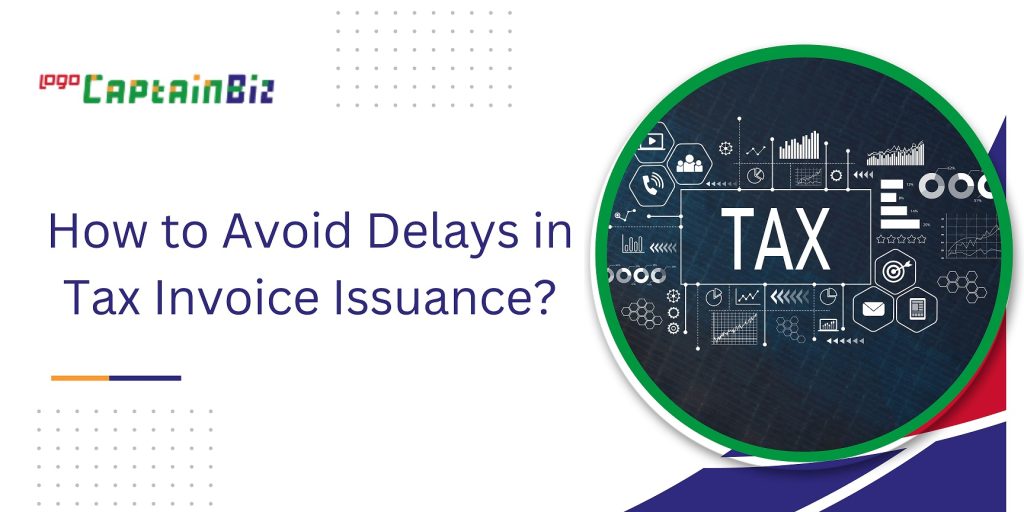Ensuring compliance with tax legislation and preserving seamless financial operations depend on timely tax invoice issuance. Accounting irregularities, late payments, and even legal repercussions might result from invoice delays. People and companies need to have efficient methods in place to guarantee that tax bills are sent out on time in order to prevent these problems. In this article, we’ll look at some doable strategies and tactics to ensure that tax bills are sent on time, assisting businesses in keeping their finances honest and operating efficiently.
How to Ensure Timely Issuance of Tax Invoice?
Maintaining legal compliance and financial control is critical, as is operational efficiency when ensuring tax invoices are sent on time. Establishing precise and uniform internal processes for creating and distributing tax invoices is crucial. These protocols ought to delineate the duties of every team member engaged in the billing process and provide standards for the timing and format of invoices. Businesses may prevent misunderstanding, minimise mistakes, and guarantee that bills are routinely sent on time by developing a well-defined procedure.
One major benefit of this approach is the usage of invoicing software. Purchasing specialised accounting and invoicing software simplifies the entire invoicing procedure. These tools enable organisations to speed up the creation and distribution of bills by having features like automatic calculations, built-in invoice templates, and payment tracking. These software programs may also be set up to automatically send clients reminders and notifications a few days before or on the due date. This helps promote on-time payments and lessen the incidence of past-due invoices.
Developing standardised invoice templates is an additional essential step. These templates should contain all relevant information, such as the firm name and contact details, a unique invoice number, a thorough description of the products or services provided, a list of the quantities and unit pricing, and the total amount owing. Pre-defined templates reduce the likelihood of missing crucial information by making the process of generating invoices quicker and easier.
How to Avoid Delays in Tax Invoice Issuance?

Here is how you can avoid delays in tax invoice issuance while following GST tax invoice issuance timelines:
1) Create Clear Internal Processes
Establish and record precise, standardised processes for preparing and distributing tax bills. Ensure everyone in your team is aware of and adheres to these protocols. To reduce misunderstandings and mistakes, clearly define roles and duties.
2) Make Use of Billing Software
Purchase specialised accounting and invoicing software. These solutions, including automatic calculations, invoice templates, and reminders, help simplify the billing process. This kind of software lowers the possibility of delays and streamlines the creation of invoices.
3) Create Uniform Invoice Templates
Make uniform invoice templates that include all the information required. These templates have to contain information about your company, an invoice number that is exclusive to you, a detailed description of the goods or services, quantity, pricing, and the total amount owed. Using templates speeds up the manufacturing process and reduces the possibility of errors.
4) Prearranged Bill Runs
Establish deadlines for the creation and distribution of invoices. A regular schedule—whether it be daily, weekly, bi-weekly, or monthly—allows your company and clients to plan and minimises payment delays.
5) Streamline Recurring Bills
Set up your invoicing software to automatically generate invoices for recurrent transactions on a regular basis. This reduces the possibility of failing to send out bills on schedule.
6) Use Alerts and Reminders
Utilise the features of your invoicing software to automatically notify and remind clients a few days before or on the due date. This can encourage early payments and lessen the possibility of delays.
7) Periodic Process Evaluations
Review and assess your invoicing practises on a regular basis to find areas where they may be made better and more efficient. Be receptive to recommendations and criticism from your team to improve the billing process.
8) Remain Up to Date on Tax Laws
Keep yourself informed on the most recent tax laws in your area. To prevent fines or legal issues, make sure your invoices adhere to the most recent tax regulations and specifications. When necessary, get advice from tax experts to guarantee compliance.
Through the implementation of these measures and dedication to timely invoicing, you may improve the financial operations of your business, cultivate customer confidence, and adhere to the relevant legal and tax compliance requirements.
Consequences of Delays in Tax Invoice Issuance
A registered person supplying taxable goods is required to issue a tax invoice before or at the time of (a) removal of goods for supply to the recipient, where the supply involves movement of goods; or (b) delivery of goods or making thereof available to the recipient, in any other case, according to Section 31(1) of the CGST Act, 2017 (the “Tax invoice”). Several consequences might arise from tax invoice delays for businesses, as well as for their interactions with tax authorities and consumers. The following are some of the main effects of a delayed tax invoice:
- Compliance Issues: A lot of tax laws and regulations mandate that tax invoices be sent out on schedule. Delayed invoicing may result in violations of these rules, which may include fines, penalties, or legal repercussions.
- Cash Flow Challenges: Keeping a healthy cash flow requires timely invoicing. Delays can interfere with incoming cash flow, making it more difficult for a company to pay its suppliers, staff, and own obligations.
- Diminished Revenue Recognition: In accounting and financial reporting, the issue of invoices is frequently a prerequisite for revenue recognition. A company’s financial statements and revenue recognition may be distorted by delayed invoicing, which may have an effect on the company’s value and financial stability.
- Customer Disputes: Misunderstandings and arguments with customers may arise from delayed invoicing. Consumers may contest the accuracy of charges, ask for revisions, or even refuse to pay until they have the necessary records.
- Strained Customer Relationships: Customer relationships that are strained can be caused by persistently late invoices, which can destroy confidence. Consumers may become less trusting of a company that cannot correctly handle its billing procedure.
- Loss of Discounts: Early payment discounts may be offered by some clients or suppliers. A company may lose out on these cost-saving possibilities if invoices are delayed.
- Legal and Contractual Repercussions: Certain agreements and contracts have clauses that address the issue of invoices. Contractual disagreements or even legal action may result from failure to abide by these requirements.
- Audit and Tax Scrutiny: Companies that often send out late invoices might be subject to increased inspection by auditors and tax authorities. In the event that disparities are discovered, this may incur further expenses and maybe even fines.
The specific penalty provision stated above may not apply if the registered taxpayer submits these unreported invoices before the department serves a notification indicating the shortfall; instead, the general penalty under Section 125 will apply.
Firms may face serious operational, financial, and legal repercussions from delays in the issuance of tax invoices. It’s critical to set up effective invoicing procedures, make an investment in appropriate invoicing software, and pay strict attention to tax laws and contractual obligations in order to prevent adverse outcomes. Maintaining the financial stability and good name of a firm requires timely invoicing, which is not only a question of good business practise but also a legal need.
Software for Issuing Tax Invoice
Because of its many uses, tax invoice issuance software is essential to today’s corporate environment. First and foremost, it acts as a pillar for tax compliance, guaranteeing that invoices are sent on time and contain all pertinent information, preventing future legal problems and financial penalties. Furthermore, these software programs automate the billing process and significantly lower the possibility of human mistakes, making them the cornerstone of operational efficiency.
This precision supports sound financial record-keeping as well as strategic planning and decision-making. By tracking unpaid invoices and accelerating revenue recognition, prompt and effective invoicing aids with cash flow management. Moreover, quick and professional billing conveys an organised and client-focused attitude, crucial in building confidence and customer satisfaction.
To protect sensitive financial information, these software solutions also provide improved data protection and backup procedures, guaranteeing organisations the integrity and confidentiality of their records. Crucially, invoicing software produces valuable financial data that can be used for forecasting, budgeting, and in-depth analysis, all of which may help firms develop sustainably.
Conclusion
In financial management, the adage “time is money” holds true, and this is especially true when it comes to issuing tax invoices. A delayed invoice can lead to a lot of problems, such as cash flow delays and regulatory non-compliance. By utilising the strategies and recommendations presented in this guide, businesses and individuals may develop a rigorous approach to ensure that tax bills are sent on schedule.
It is vital to treat the issuance of tax invoices with the same diligence and care as any other financial aspect of your business or personal finances. Timely invoicing not only facilitates smoother financial transactions but also reflects a commitment to responsible financial management and compliance with tax laws. By learning how to create efficient invoicing processes, setting reminders, and maintaining good record-keeping practices you can significantly reduce the risk of invoicing delays and their associated consequences. Learn the tax invoice issuance best practices from CaptainBiz.
FAQs
Q1: Who should send a tax invoice?
A registered individual who provides taxable products, services, or both and collects GST from the client should provide a tax invoice.
Q2: How much time does it take to send a tax invoice?
Rule 47 states that tax invoices must be delivered thirty days from the date of service delivery. This is the deadline for their distribution.
Q3: What is a tax invoice?
A registered individual who provides taxable products or services, or both, and also charges GST to the client must provide a tax invoice. In addition to enabling the seller to collect GST from his customers and claim Input Tax Credit (ITC) on GST paid to his suppliers, a tax invoice displays the GST rate charged on the products and services provided.
Q4: Is it appropriate to send a bill of supply rather than a tax invoice?
Bill of Supply: If a registered person is paying tax under the composition system or is supplying exempt goods or services, or both, a bill of supply should be given in place of a tax invoice. Since the supplier is not permitted to charge GST to the customer, a bill of supply does not include a tax amount.
Q5: When should a registered person issue a tax invoice?
When providing taxable products, a registered individual must provide a tax invoice. When the items are removed to be supplied to the receiver, the invoice must be sent either beforehand or right away. The invoice must be sent as soon as the items are made accessible to the receiver in cases where the supply does not require the transportation of the goods.

